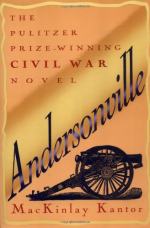“Janie, have another biscuit, do!”
Or,
“Eddie, son, won’t you have another piece of this nice steak?”
Or,
“Maggie, have some more potatos,” and so on, through a whole family of six, or more. It was a relief to us when he died in about a month after he came in.
As stated above, the Plymouth men brought in a large amount of money —variously estimated at from ten thousand to one hundred thousand dollars. The presence of this quantity of circulating medium immediately started a lively commerce. All sorts of devices were resorted to by the other prisoners to get a little of this wealth. Rude chuck-a-luck boards were constructed out of such material as was attainable, and put in operation. Dice and cards were brought out by those skilled in such matters. As those of us already in the Stockade occupied all the ground, there was no disposition on the part of many to surrender a portion of their space without exacting a pecuniary compensation. Messes having ground in a good location would frequently demand and get ten dollars for permission for two or three to quarter with them. Then there was a great demand for poles to stretch blankets over to make tents; the Rebels, with their usual stupid cruelty, would not supply these, nor allow the prisoners to go out and get them themselves. Many of the older prisoners had poles to spare which they were saying up for fuel. They sold these to the Plymouth folks at the rate of ten dollars for three—enough to put up a blanket.
The most considerable trading was done through the gates. The Rebel guards were found quite as keen to barter as they had been in Richmond. Though the laws against their dealing in the money of the enemy were still as stringent as ever, their thirst for greenbacks was not abated one whit, and they were ready to sell anything they had for the coveted currency. The rate of exchange was seven or eight dollars in Confederate money for one dollar in greenbacks. Wood, tobacco, meat, flour, beans, molasses, onions and a villainous kind of whisky made from sorghum, were the staple articles of trade. A whole race of little traffickers in these articles sprang up, and finally Selden, the Rebel Quartermaster, established a sutler shop in the center of the North Side, which he put in charge of Ira Beverly, of the One Hundredth Ohio, and Charlie Huckleby, of the Eighth Tennessee. It was a fine illustration of the development of the commercial instinct in some men. No more unlikely place for making money could be imagined, yet starting in without a cent, they contrived to turn and twist and trade, until they had transferred to their pockets a portion of the funds which were in some one else’s. The Rebels, of course, got nine out of every ten dollars there was in the prison, but these middle men contrived to have a little of it stick to their fingers.
It was only the very few who were able to do this. Nine hundred and ninety-nine out of every thousand were, like myself, either wholly destitute of money and unable to get it from anybody else, or they paid out what money they had to the middlemen, in exorbitant prices for articles of food.




